
JOURNAL OF THE JAPANESE SOCIETY FOR FOOD SCIENCE AND TECHNOLOGY-NIPPON SHOKUHIN KAGAKU KOGAKU KAISHI
Scope & Guideline
Exploring the Frontiers of Food Science in Japan
Introduction
Aims and Scopes
- Food Quality and Safety:
Research on the quality and safety of food products, including studies on microbial contamination, quality evaluation methods, and the impact of various processing techniques on food safety. - Food Processing and Technology:
Innovations in food processing techniques, including the development of new technologies, application of traditional methods, and optimization of processing parameters to enhance food quality. - Nutritional Science and Health:
Exploration of the nutritional properties of food, the impact of dietary components on health, and the development of functional foods that promote well-being. - Consumer Preferences and Sensory Evaluation:
Studies focusing on consumer preferences, sensory evaluation of food products, and the relationship between food attributes and consumer behavior. - Food Chemistry and Biochemistry:
Investigations into the chemical and biochemical properties of food components, including the analysis of antioxidants, flavors, and functional compounds. - Sustainable Food Systems:
Research addressing sustainability in food production, including studies on food waste, sustainable agricultural practices, and the environmental impact of food technologies.
Trending and Emerging
- Functional Foods and Health Benefits:
A growing emphasis on the development and evaluation of functional foods that offer health benefits beyond basic nutrition, responding to consumer demand for health-oriented food products. - Food Texture and Sensory Studies:
An increasing focus on the texture and sensory characteristics of food, utilizing advanced sensory evaluation techniques and consumer testing to better understand food acceptability. - Microbial and Enzyme Applications in Food Processing:
Research on the application of specific microbes and enzymes in food processing is on the rise, highlighting the importance of biotechnology in enhancing food quality and safety. - Sustainability and Environmental Impact:
Emerging themes around sustainability, including research on reducing food waste, sustainable sourcing, and the environmental effects of food production practices. - Consumer Behavior and Food Technology Interaction:
Studies exploring the intersection of consumer behavior and food technology, particularly how technological advancements influence consumer choices and perceptions.
Declining or Waning
- Traditional Fermentation Techniques:
While fermentation remains a topic of interest, the focus on traditional methods has declined in favor of more innovative and scientifically rigorous approaches to fermentation that prioritize functional benefits. - Basic Agricultural Practices:
Research specifically centered on basic agricultural practices has decreased as the journal increasingly emphasizes technological advancements and their applications in food science. - Historical Food Studies:
Studies focused on historical aspects of food science or traditional food practices are less frequent, indicating a shift towards contemporary issues and modern scientific inquiry.
Similar Journals
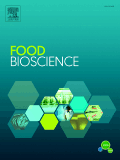
Food Bioscience
Bridging Disciplines to Transform Global Food SystemsFood Bioscience is a leading peer-reviewed journal published by Elsevier, dedicated to advancing the understanding of the complex interplay between food science and biosciences. With an impressive Impact Factor that places it in the Q1 and Q2 quartiles for Food Science and Biochemistry respectively, the journal consistently ranks among the top publications in its field, reflected in its Scopus rankings (Rank #83/389 in Food Science and Rank #175/438 in Biochemistry). Since its inception in 2013, Food Bioscience has fostered a multidisciplinary approach, bridging gaps between research in agricultural, biological, and food sciences, thus encouraging innovative solutions to the pressing challenges facing the global food supply chain. Although it currently operates under a subscription model, the journal is committed to disseminating high-quality research, making significant contributions to both academic scholarship and industry practices. Researchers, professionals, and students alike are invited to explore the wealth of knowledge contained within its pages as it plays a pivotal role in shaping the future of food bioscience.
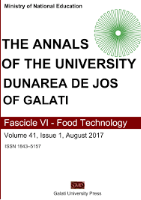
Annals of the University Dunarea de Jos of Galati, Fascicle VI-Food Technology
Transforming Insights into Food SolutionsAnnals of the University Dunarea de Jos of Galati, Fascicle VI-Food Technology is a distinguished academic journal published by GALATI UNIV PRESS, dedicated to advancing knowledge in the field of food technology. With an open access format since 2007, this journal enhances accessibility to research findings and facilitates the dissemination of innovative ideas among researchers, professionals, and students worldwide. The journal holds a noteworthy position in its category, boasting a 2023 Q3 ranking in both Food Science and Industrial and Manufacturing Engineering, indicating its relevance and contribution to these critical fields. As it converges years of publication from 2012 to 2023, it encapsulates an evolving body of knowledge that reflects the latest advancements and research trends. Although it may not yet have a defined HIndex, its presence in Scopus with ranks of #253 in Industrial and Manufacturing Engineering and #278 in Food Science underscores its emerging impact. This journal is particularly significant for those engaged in research related to food technology and engineering, facilitating dialogue and collaboration within the community while addressing pressing challenges and innovations in food processing and safety. With its commitment to quality research, Annals of the University Dunarea de Jos of Galati serves as an essential resource for fostering knowledge and promoting scientific discussion.
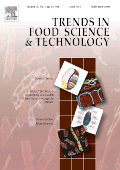
TRENDS IN FOOD SCIENCE & TECHNOLOGY
Transforming knowledge into culinary breakthroughs.Trends in Food Science & Technology, published by Elsevier Science London, stands as a premier journal in the fields of food science and biotechnology. With an impressive Q1 ranking in both the food science and biotechnology categories, it is recognized for its rigorous peer-reviewed articles that advance knowledge and innovation in the sector. The journal’s Scopus rankings validate its significance, placing it in the top percentile among its peers, with a remarkable rank of #2 out of 389 in Agricultural and Biological Sciences - Food Science, and #4 out of 311 in Biochemistry, Genetics, and Molecular Biology - Biotechnology. Since its inception in 1990, the journal has become a vital resource for researchers, professionals, and students alike, offering insights into contemporary challenges and trends impacting food technology. Although it operates under a subscription model, the quality of research published within its pages makes it an essential read for anyone involved in advancing the science of food.

International Food Research Journal
Fostering Excellence in Global Food ResearchThe International Food Research Journal, published by UNIV PUTRA MALAYSIA PRESS, serves as a pivotal platform for disseminating innovative research within the field of food science. With an ISSN of 1985-4668 and an E-ISSN of 2231-7546, the journal has successfully established its presence since its inception in 2007, converging its findings through 2024. This esteemed journal holds a Q3 ranking in Food Science, illustrating its valuable contributions to the field as demonstrated by its Scopus rank of 276 out of 389, placing it in the 29th percentile among its peers in Agricultural and Biological Sciences. Although it operates under a traditional publishing model, its academic integrity and focus on high-quality research ensure that it remains a vital resource for researchers, professionals, and students eager to explore advances in food technology, nutrition, and safety. By encouraging interdisciplinary collaboration and critical dialogue, the International Food Research Journal plays an essential role in shaping the future of food science research.
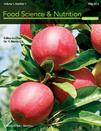
Food Science & Nutrition
Advancing knowledge in food science for a healthier tomorrow.Food Science & Nutrition is an esteemed peer-reviewed journal published by WILEY, dedicated to advancing the fields of food science and nutritional research. With an impressive impact factor and a prestigious Q1 ranking in the Food Science category, this journal stands out as a leading platform for innovative research, offering meaningful insights into the relationship between food composition and health outcomes. Since its transition to Open Access in 2013, Food Science & Nutrition has championed the global dissemination of knowledge, ensuring that vital research is accessible to researchers, professionals, and students alike. With a vast scope that encompasses both agricultural and biological sciences, the journal provides a comprehensive view of emerging trends, methodologies, and applications in food security and nutrition, making it indispensable for those invested in these critical areas.

Journal of Food and Nutrition Research
Advancing the Science of Nutrition and Food QualityJournal of Food and Nutrition Research, published by the VUP FOOD RESEARCH INST in Bratislava, Slovakia, serves as a vital platform for disseminating cutting-edge research in the fields of food science and nutrition. With an ISSN of 1336-8672 and an E-ISSN of 1338-4260, this journal emphasizes the importance of interdisciplinary approaches to address contemporary challenges related to food quality, dietary practices, and nutritional health. Notably recognized in the 2023 Scopus rankings, the journal is classified in Q3 quartiles for both Food Science and Nutrition & Dietetics, providing a forum for researchers aiming to enhance knowledge and practices within these domains. Those engaged in academia and industry will find the journal invaluable for its comprehensive scope, which covers novel food technologies, nutrition interventions, and the implications of dietary behaviors. Though not open access, the journal is dedicated to enriching the academic conversation and contributing to advancements in public health and nutrition policies.

Current Research in Nutrition and Food Science
Fostering collaboration for global nutritional advancements.Current Research in Nutrition and Food Science is a premier academic journal dedicated to advancing knowledge in the fields of nutrition and food science. Published by ENVIRO RESEARCH PUBLISHERS, this journal serves as a critical platform for researchers, professionals, and students to disseminate impactful research findings. With its Q3 ranking in both Food Science and Medicine (miscellaneous) categories for 2023, it reflects its commitment to quality and relevance within these disciplines. The journal operates under an open access model, ensuring that its content is readily available to a global audience, thus promoting collaboration and innovation across various sectors. Covering a wide range of topics from agricultural practices to the biochemical aspects of nutrition, Current Research in Nutrition and Food Science invites contributions that push the boundaries of understanding, addressing contemporary challenges in food safety, dietary health, and nutrition policies. As it continues its journey from 2013 to 2024 and beyond, the journal occupies an essential role in fostering a dialogue among scholars and practitioners, supporting the advancement of science and, ultimately, healthier global communities.
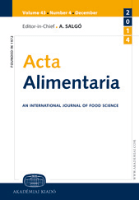
ACTA ALIMENTARIA
Championing research excellence in the food industry.ACTA ALIMENTARIA is a renowned journal in the field of food science, published by AKADEMIAI KIADO ZRT, based in Hungary. Since its inception in 1973, it has served as a vital platform for disseminating high-quality research on food chemistry, microbiology, nutrition, and technology, contributing significantly to the advancement of knowledge in the agricultural and biological sciences. Currently classified in the Q3 quartile of the 2023 Food Science category, the journal is positioned to address pressing issues pertaining to food safety, quality, and sustainability, making it an invaluable resource for researchers, professionals, and students alike. Although it does not currently offer open access, the journal maintains a strong reputation with a readership keenly interested in the latest developments in food science. With a Scopus rank placing it in the 38th percentile of its category, ACTA ALIMENTARIA continues to be a pivotal reference for those engaged in food research and innovation.
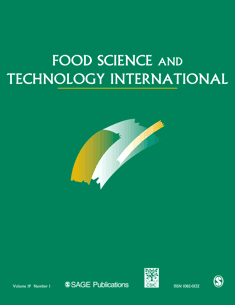
FOOD SCIENCE AND TECHNOLOGY INTERNATIONAL
Fostering knowledge and innovation in food science.FOOD SCIENCE AND TECHNOLOGY INTERNATIONAL, published by SAGE Publications Ltd, is a premier journal in the fields of food science and technology, serving as a crucial platform for the dissemination of innovative research and practical applications from 1995 through to 2024. With an impact factor reflecting its significant standing—ranking in the Q2 quartile for Chemical Engineering, Food Science, and Industrial and Manufacturing Engineering—this journal plays an instrumental role in advancing the interdisciplinary study of food systems. Researchers, professionals, and students can access high-quality contributions that address the latest developments and trends in food technology, safety, and processing. Located in the United States, FOOD SCIENCE AND TECHNOLOGY INTERNATIONAL also boasts commendable Scopus rankings, ensuring its articles are both relevant and widely cited within the academic community. As a vital resource for anyone engaged in food science research, этот журнал fosters knowledge sharing and innovation in the ever-evolving landscape of food technology.
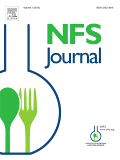
NFS Journal
Connecting scholars and practitioners through impactful research.NFS Journal, published by ELSEVIER, is at the forefront of research in the fields of Food Science and Nutrition and Dietetics, boasting an impressive impact factor that underscores its significance. With an Open Access model since 2015, the journal facilitates widespread dissemination and accessibility of high-quality research, making it a valuable resource for scholars and practitioners alike. Located in Germany, this journal has made its mark with its prestigious Q1 ranking in both Food Science and Nutrition and Dietetics as of 2023, positioning it among the top-tier journals in these disciplines. Additionally, it holds an outstanding standing in Scopus rankings, being placed at 10th out of 140 in Nutrition and Dietetics and at 27th out of 389 in Food Science, reflecting its influence and reach within the global academic community. The NFS Journal is dedicated to publishing the latest advancements and practices that shape our understanding of the relationship between food, health, and nutrition, appealing to researchers, professionals, and students eager to stay updated with novel insights and breakthroughs.